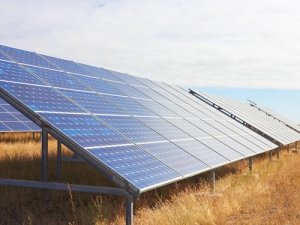EECA funding helps winegrowers adopt solar and battery systems
Winegrowers interested in exploring solar and battery systems on their vineyards could tap into funding and advice through a new funding programme.
 Solar power can be a cost-effective way to offset energy costs, providing you can make the initial investment.
Solar power can be a cost-effective way to offset energy costs, providing you can make the initial investment.
Using solar energy to partly power farm irrigation systems may be now within the reach of Australian dairy farmers, according to a new report.
Commissioned by Queensland Dairyfarmers and completed by The Energy Guys, the report is said to show that solar photo-voltaics (PV) can pay off depending on a farm's cost of electricity and pattern of demand. The report is called 'Feasibility of Alternative Energy in Irrigation Systems'.
The solar system would need supplementing by grid power and its success may also depend on farmers changing how they irrigate.
The results were revealed at an alternative energy field day at John Bradfield's dairy farm on the Southern Downs near Allora in Queensland. Bradfield's 27ha centre pivot irrigator was used in weighing up solar PV as an energy source.
Energy Guys' spokesman Nick Bullock says the technology and systems are there for solar PV to be used.
"We wanted to get figures to see if it is way off the scale, but it's not far off. PV with grid is out there and within the realms of realism. The key is having the confidence to change the way you irrigate and still achieve the water requirements.
"We're not talking about a small investment, but if you look at it as the long-term power source for your irrigator, and the kilowatts it is going to use, it can be attractive."
Bullock says the use of solar PV – plus the grid – for irrigation systems will be fairly common within 10 years.
"There will be systems out there, not fully replacing but offsetting some costs of irrigation. We've got to break through people's perception that it's not feasible."
The trial compared the energy use of Bradfield's irrigation system with using solar PV.
Bullock says if Bradfield continued to irrigate as he does now – 24-hour pumping four days on/four days off over summer – solar PV wouldn't be economical.
"But if he changed the way he irrigates, and if he irrigates when solar PV is available and can be supplemented by grid power, then the project stacks up much better
and is probably worth doing. If he continues to irrigate overnight it won't work."
Bullock says many farmers have tried to use off-peak power for irrigation.
"If you're using more overnight power the payback will be longer. Anyone interested would have to look at their own set-up and costs. [By using it] you're hedging your management costs by investing in your own power plant which is going to cost 6-12 cents over 25 years."
But solar PV could not work alone; it must be connected to the grid. "We looked at it as a stand-alone operation, but on the 'shoulders' morning and evening it's not going to run the irrigation plant on its own."
The other option investigated was solar PV with batteries but the cost would be $300,000-$350,000 with a payback up to 15 years – unreasonable at the moment. "It would be a stand-alone system off-grid so you'd need a bank of batteries and a bigger system – probably a 99kW peak system."
Bullock says sunny Queensland is ideal for solar PV. "There would still be some offset in southern states, but the total kilowatt hours generated there is less than Queensland. The biggest difference is the substantial reduction in generation over winter."
New Zealand's new Special Agricultural Trade Envoy, Horowhenua dairy farmer, company director and former Minister of Agriculture, Nathan Guy says the Free Trade Agreement (FTA) with India is a good deal for the country.
New figures show dairy farmers are not only holding on to their international workforce, but are also supporting those staff to step into higher-skilled roles on farm.
New tractor deliveries for 2025 jumped 10% compared to the previous year, a reflection of the positive primary sector outlook, according to the Tractor and Machinery Association (TAMA).
Entries have opened for two awards in the New Zealand Dairy Industry Awards (NZDIA) programme, aimed at helping young farmers progress to farm ownership.
Federated Farmers has confirmed interim chief executive Mike Siermans to the role.
Registrations are now open for the 2026 Ruralco Golf Classic, with all proceeds from the event set to support the Mid Canterbury Rural Support Trust.
OPINION: When it comes to New Zealand's foreign relations, Foreign Minister Winston Peters likes to make all the big calls;…
OPINION: Another example of the dairy sector getting shortchanged in free trade deals?